Research Project: Dementia's Impact on UK Families' Well-being
VerifiedAdded on 2023/04/04
|29
|7405
|229
Report
AI Summary
This report presents a research project analyzing the multifaceted impact of dementia on families within the United Kingdom. The study delves into the increasing prevalence of dementia, particularly among the elderly, and its subsequent social and economic consequences. It explores the challenges faced by caregivers, including social isolation, strained family relationships, and financial burdens. The research examines the impact of dementia on household finances, healthcare costs, and the sacrifices made by caregivers. The report also investigates government legislations and policies aimed at addressing the crisis, identifying both successful implementations and areas needing improvement. The methodology includes a literature review, conceptual framework, and thematic analysis to identify the impact of dementia. The project concludes with recommendations for supporting families and suggests areas for further research, contributing to a deeper understanding of this critical issue and potential solutions to mitigate its effects.

UNIT 6 RESEARCH PROJECT
ASSIGNMENT
STUDENT NAME:
STUDENT ID:
PROFESSOR NAME:
ASSIGNMENT
STUDENT NAME:
STUDENT ID:
PROFESSOR NAME:
Paraphrase This Document
Need a fresh take? Get an instant paraphrase of this document with our AI Paraphraser
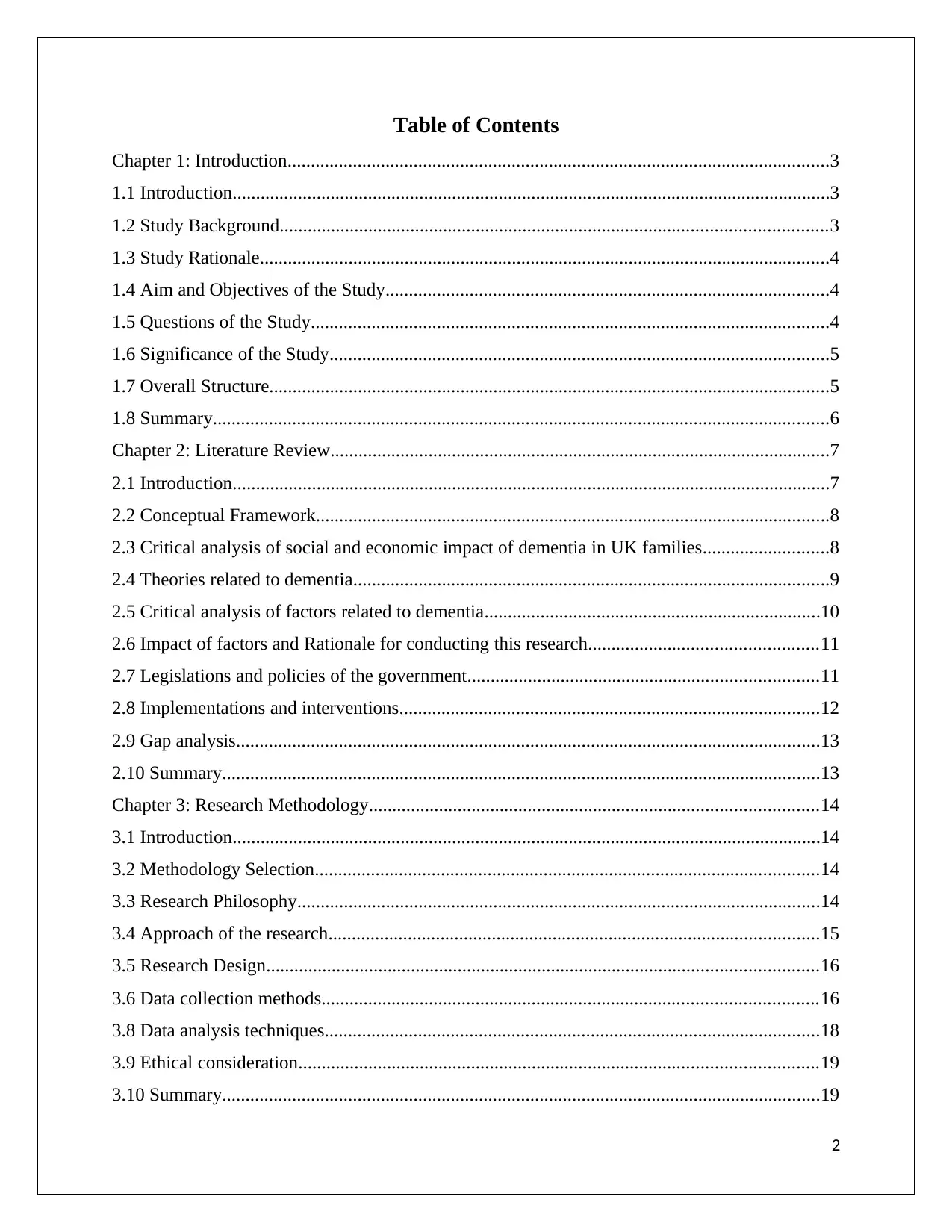
Table of Contents
Chapter 1: Introduction....................................................................................................................3
1.1 Introduction................................................................................................................................3
1.2 Study Background.....................................................................................................................3
1.3 Study Rationale..........................................................................................................................4
1.4 Aim and Objectives of the Study...............................................................................................4
1.5 Questions of the Study...............................................................................................................4
1.6 Significance of the Study...........................................................................................................5
1.7 Overall Structure........................................................................................................................5
1.8 Summary....................................................................................................................................6
Chapter 2: Literature Review...........................................................................................................7
2.1 Introduction................................................................................................................................7
2.2 Conceptual Framework..............................................................................................................8
2.3 Critical analysis of social and economic impact of dementia in UK families...........................8
2.4 Theories related to dementia......................................................................................................9
2.5 Critical analysis of factors related to dementia........................................................................10
2.6 Impact of factors and Rationale for conducting this research.................................................11
2.7 Legislations and policies of the government...........................................................................11
2.8 Implementations and interventions..........................................................................................12
2.9 Gap analysis.............................................................................................................................13
2.10 Summary................................................................................................................................13
Chapter 3: Research Methodology................................................................................................14
3.1 Introduction..............................................................................................................................14
3.2 Methodology Selection............................................................................................................14
3.3 Research Philosophy................................................................................................................14
3.4 Approach of the research.........................................................................................................15
3.5 Research Design......................................................................................................................16
3.6 Data collection methods..........................................................................................................16
3.8 Data analysis techniques..........................................................................................................18
3.9 Ethical consideration...............................................................................................................19
3.10 Summary................................................................................................................................19
2
Chapter 1: Introduction....................................................................................................................3
1.1 Introduction................................................................................................................................3
1.2 Study Background.....................................................................................................................3
1.3 Study Rationale..........................................................................................................................4
1.4 Aim and Objectives of the Study...............................................................................................4
1.5 Questions of the Study...............................................................................................................4
1.6 Significance of the Study...........................................................................................................5
1.7 Overall Structure........................................................................................................................5
1.8 Summary....................................................................................................................................6
Chapter 2: Literature Review...........................................................................................................7
2.1 Introduction................................................................................................................................7
2.2 Conceptual Framework..............................................................................................................8
2.3 Critical analysis of social and economic impact of dementia in UK families...........................8
2.4 Theories related to dementia......................................................................................................9
2.5 Critical analysis of factors related to dementia........................................................................10
2.6 Impact of factors and Rationale for conducting this research.................................................11
2.7 Legislations and policies of the government...........................................................................11
2.8 Implementations and interventions..........................................................................................12
2.9 Gap analysis.............................................................................................................................13
2.10 Summary................................................................................................................................13
Chapter 3: Research Methodology................................................................................................14
3.1 Introduction..............................................................................................................................14
3.2 Methodology Selection............................................................................................................14
3.3 Research Philosophy................................................................................................................14
3.4 Approach of the research.........................................................................................................15
3.5 Research Design......................................................................................................................16
3.6 Data collection methods..........................................................................................................16
3.8 Data analysis techniques..........................................................................................................18
3.9 Ethical consideration...............................................................................................................19
3.10 Summary................................................................................................................................19
2
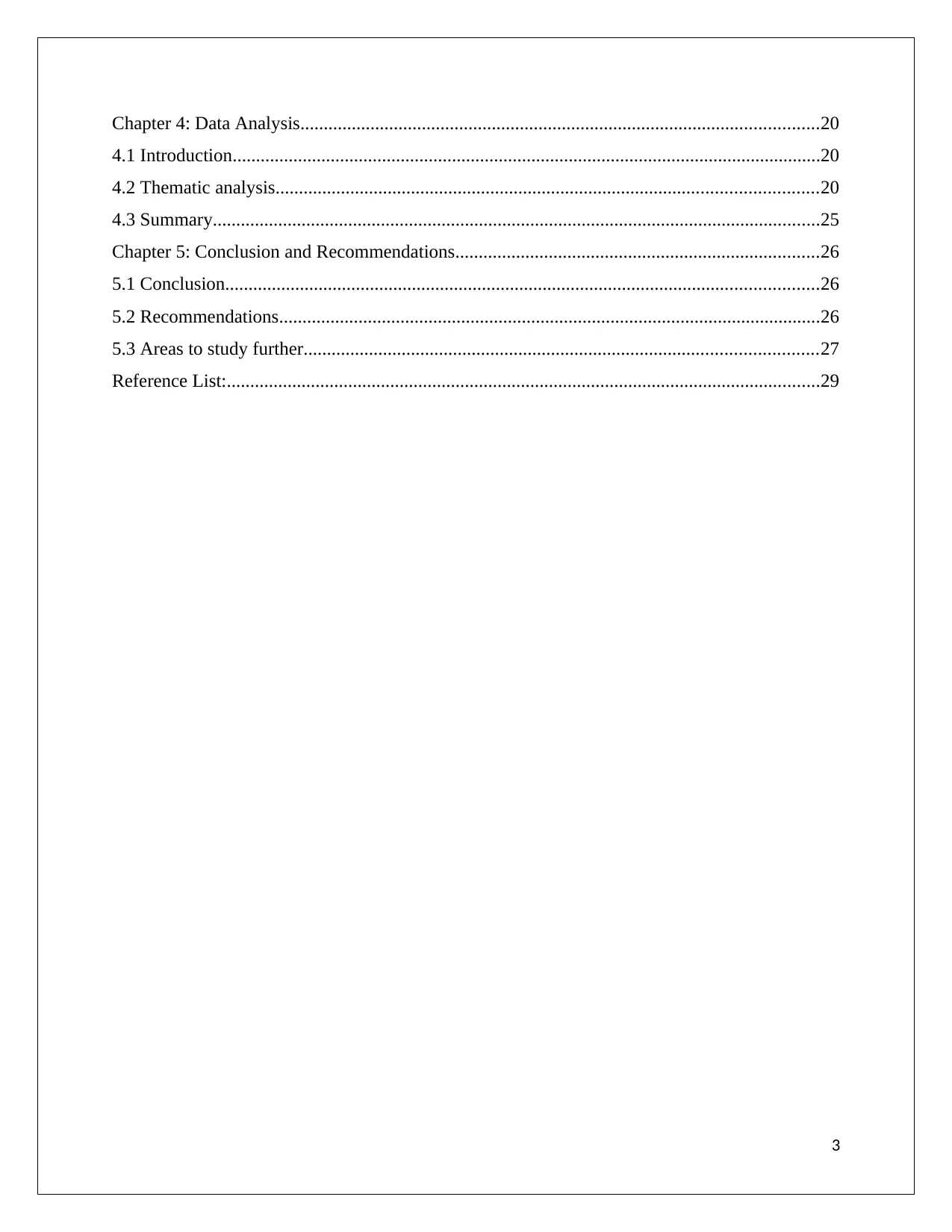
Chapter 4: Data Analysis...............................................................................................................20
4.1 Introduction..............................................................................................................................20
4.2 Thematic analysis....................................................................................................................20
4.3 Summary..................................................................................................................................25
Chapter 5: Conclusion and Recommendations..............................................................................26
5.1 Conclusion...............................................................................................................................26
5.2 Recommendations....................................................................................................................26
5.3 Areas to study further..............................................................................................................27
Reference List:...............................................................................................................................29
3
4.1 Introduction..............................................................................................................................20
4.2 Thematic analysis....................................................................................................................20
4.3 Summary..................................................................................................................................25
Chapter 5: Conclusion and Recommendations..............................................................................26
5.1 Conclusion...............................................................................................................................26
5.2 Recommendations....................................................................................................................26
5.3 Areas to study further..............................................................................................................27
Reference List:...............................................................................................................................29
3
⊘ This is a preview!⊘
Do you want full access?
Subscribe today to unlock all pages.

Trusted by 1+ million students worldwide
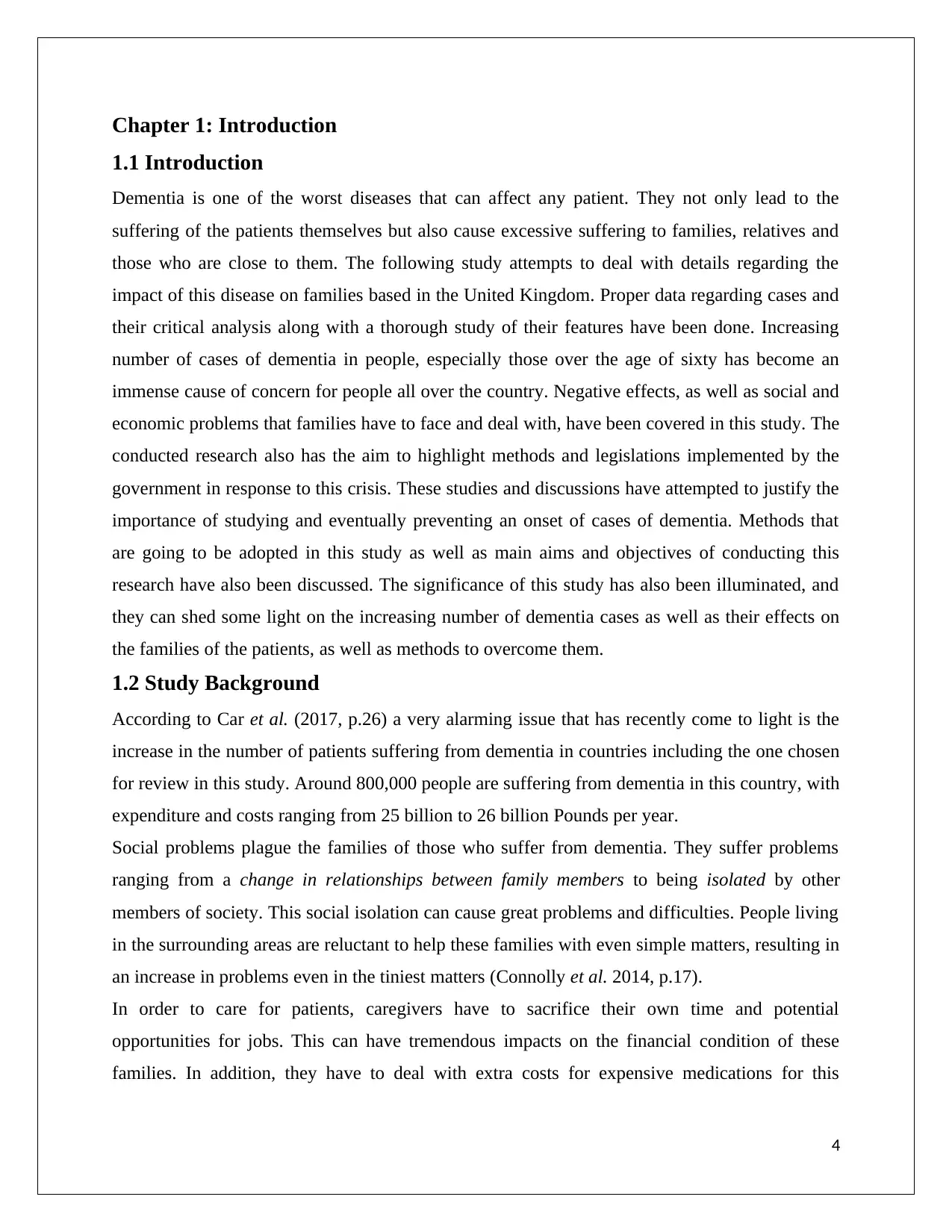
Chapter 1: Introduction
1.1 Introduction
Dementia is one of the worst diseases that can affect any patient. They not only lead to the
suffering of the patients themselves but also cause excessive suffering to families, relatives and
those who are close to them. The following study attempts to deal with details regarding the
impact of this disease on families based in the United Kingdom. Proper data regarding cases and
their critical analysis along with a thorough study of their features have been done. Increasing
number of cases of dementia in people, especially those over the age of sixty has become an
immense cause of concern for people all over the country. Negative effects, as well as social and
economic problems that families have to face and deal with, have been covered in this study. The
conducted research also has the aim to highlight methods and legislations implemented by the
government in response to this crisis. These studies and discussions have attempted to justify the
importance of studying and eventually preventing an onset of cases of dementia. Methods that
are going to be adopted in this study as well as main aims and objectives of conducting this
research have also been discussed. The significance of this study has also been illuminated, and
they can shed some light on the increasing number of dementia cases as well as their effects on
the families of the patients, as well as methods to overcome them.
1.2 Study Background
According to Car et al. (2017, p.26) a very alarming issue that has recently come to light is the
increase in the number of patients suffering from dementia in countries including the one chosen
for review in this study. Around 800,000 people are suffering from dementia in this country, with
expenditure and costs ranging from 25 billion to 26 billion Pounds per year.
Social problems plague the families of those who suffer from dementia. They suffer problems
ranging from a change in relationships between family members to being isolated by other
members of society. This social isolation can cause great problems and difficulties. People living
in the surrounding areas are reluctant to help these families with even simple matters, resulting in
an increase in problems even in the tiniest matters (Connolly et al. 2014, p.17).
In order to care for patients, caregivers have to sacrifice their own time and potential
opportunities for jobs. This can have tremendous impacts on the financial condition of these
families. In addition, they have to deal with extra costs for expensive medications for this
4
1.1 Introduction
Dementia is one of the worst diseases that can affect any patient. They not only lead to the
suffering of the patients themselves but also cause excessive suffering to families, relatives and
those who are close to them. The following study attempts to deal with details regarding the
impact of this disease on families based in the United Kingdom. Proper data regarding cases and
their critical analysis along with a thorough study of their features have been done. Increasing
number of cases of dementia in people, especially those over the age of sixty has become an
immense cause of concern for people all over the country. Negative effects, as well as social and
economic problems that families have to face and deal with, have been covered in this study. The
conducted research also has the aim to highlight methods and legislations implemented by the
government in response to this crisis. These studies and discussions have attempted to justify the
importance of studying and eventually preventing an onset of cases of dementia. Methods that
are going to be adopted in this study as well as main aims and objectives of conducting this
research have also been discussed. The significance of this study has also been illuminated, and
they can shed some light on the increasing number of dementia cases as well as their effects on
the families of the patients, as well as methods to overcome them.
1.2 Study Background
According to Car et al. (2017, p.26) a very alarming issue that has recently come to light is the
increase in the number of patients suffering from dementia in countries including the one chosen
for review in this study. Around 800,000 people are suffering from dementia in this country, with
expenditure and costs ranging from 25 billion to 26 billion Pounds per year.
Social problems plague the families of those who suffer from dementia. They suffer problems
ranging from a change in relationships between family members to being isolated by other
members of society. This social isolation can cause great problems and difficulties. People living
in the surrounding areas are reluctant to help these families with even simple matters, resulting in
an increase in problems even in the tiniest matters (Connolly et al. 2014, p.17).
In order to care for patients, caregivers have to sacrifice their own time and potential
opportunities for jobs. This can have tremendous impacts on the financial condition of these
families. In addition, they have to deal with extra costs for expensive medications for this
4
Paraphrase This Document
Need a fresh take? Get an instant paraphrase of this document with our AI Paraphraser
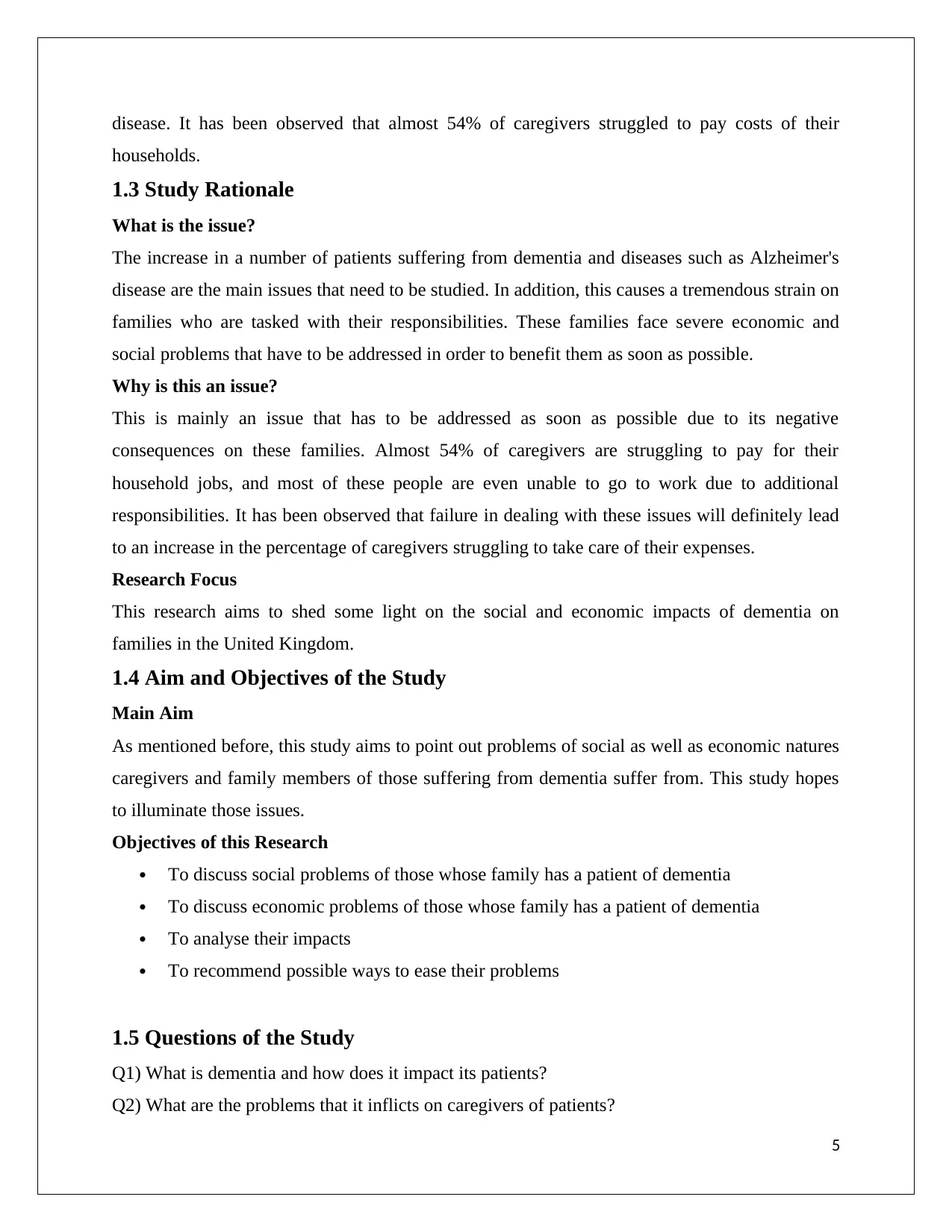
disease. It has been observed that almost 54% of caregivers struggled to pay costs of their
households.
1.3 Study Rationale
What is the issue?
The increase in a number of patients suffering from dementia and diseases such as Alzheimer's
disease are the main issues that need to be studied. In addition, this causes a tremendous strain on
families who are tasked with their responsibilities. These families face severe economic and
social problems that have to be addressed in order to benefit them as soon as possible.
Why is this an issue?
This is mainly an issue that has to be addressed as soon as possible due to its negative
consequences on these families. Almost 54% of caregivers are struggling to pay for their
household jobs, and most of these people are even unable to go to work due to additional
responsibilities. It has been observed that failure in dealing with these issues will definitely lead
to an increase in the percentage of caregivers struggling to take care of their expenses.
Research Focus
This research aims to shed some light on the social and economic impacts of dementia on
families in the United Kingdom.
1.4 Aim and Objectives of the Study
Main Aim
As mentioned before, this study aims to point out problems of social as well as economic natures
caregivers and family members of those suffering from dementia suffer from. This study hopes
to illuminate those issues.
Objectives of this Research
To discuss social problems of those whose family has a patient of dementia
To discuss economic problems of those whose family has a patient of dementia
To analyse their impacts
To recommend possible ways to ease their problems
1.5 Questions of the Study
Q1) What is dementia and how does it impact its patients?
Q2) What are the problems that it inflicts on caregivers of patients?
5
households.
1.3 Study Rationale
What is the issue?
The increase in a number of patients suffering from dementia and diseases such as Alzheimer's
disease are the main issues that need to be studied. In addition, this causes a tremendous strain on
families who are tasked with their responsibilities. These families face severe economic and
social problems that have to be addressed in order to benefit them as soon as possible.
Why is this an issue?
This is mainly an issue that has to be addressed as soon as possible due to its negative
consequences on these families. Almost 54% of caregivers are struggling to pay for their
household jobs, and most of these people are even unable to go to work due to additional
responsibilities. It has been observed that failure in dealing with these issues will definitely lead
to an increase in the percentage of caregivers struggling to take care of their expenses.
Research Focus
This research aims to shed some light on the social and economic impacts of dementia on
families in the United Kingdom.
1.4 Aim and Objectives of the Study
Main Aim
As mentioned before, this study aims to point out problems of social as well as economic natures
caregivers and family members of those suffering from dementia suffer from. This study hopes
to illuminate those issues.
Objectives of this Research
To discuss social problems of those whose family has a patient of dementia
To discuss economic problems of those whose family has a patient of dementia
To analyse their impacts
To recommend possible ways to ease their problems
1.5 Questions of the Study
Q1) What is dementia and how does it impact its patients?
Q2) What are the problems that it inflicts on caregivers of patients?
5
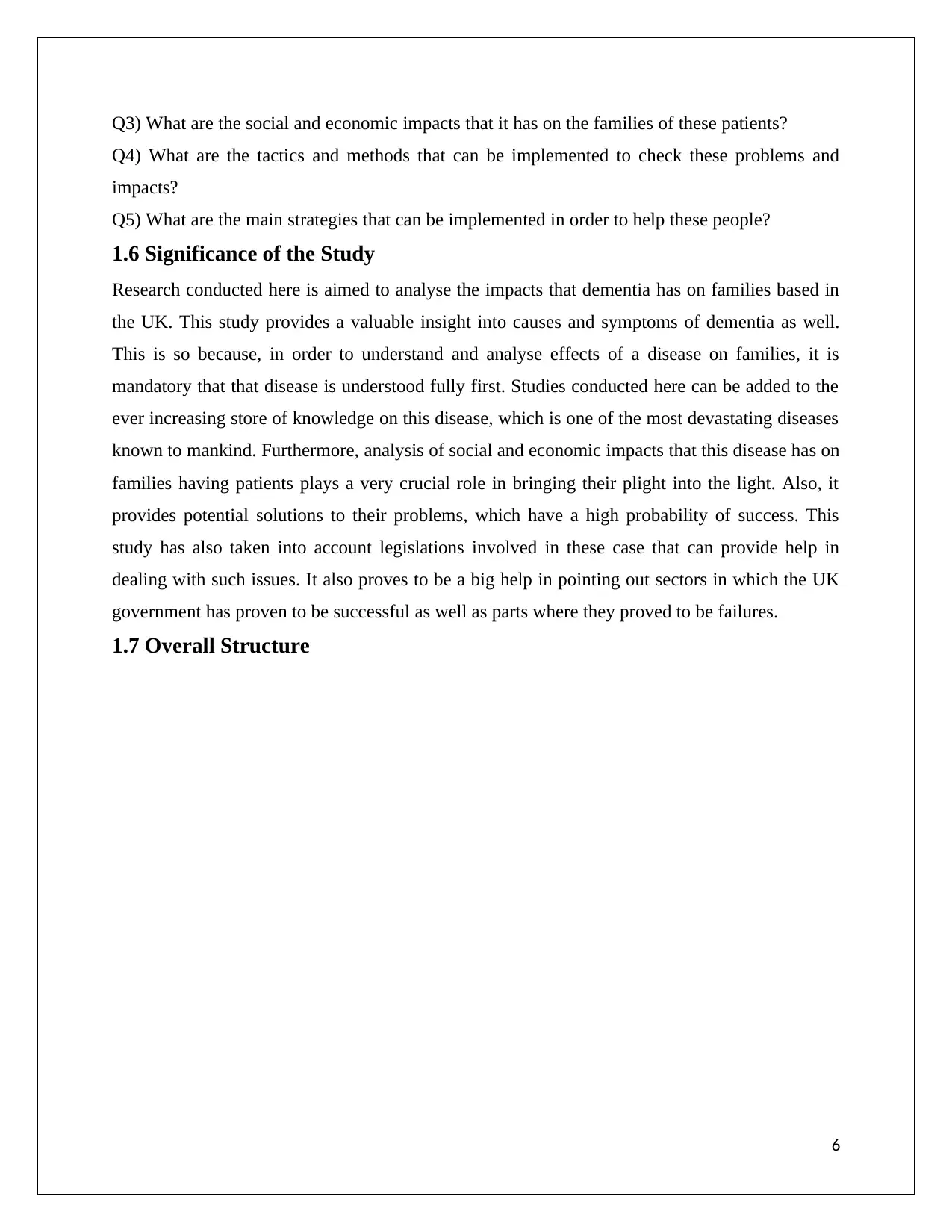
Q3) What are the social and economic impacts that it has on the families of these patients?
Q4) What are the tactics and methods that can be implemented to check these problems and
impacts?
Q5) What are the main strategies that can be implemented in order to help these people?
1.6 Significance of the Study
Research conducted here is aimed to analyse the impacts that dementia has on families based in
the UK. This study provides a valuable insight into causes and symptoms of dementia as well.
This is so because, in order to understand and analyse effects of a disease on families, it is
mandatory that that disease is understood fully first. Studies conducted here can be added to the
ever increasing store of knowledge on this disease, which is one of the most devastating diseases
known to mankind. Furthermore, analysis of social and economic impacts that this disease has on
families having patients plays a very crucial role in bringing their plight into the light. Also, it
provides potential solutions to their problems, which have a high probability of success. This
study has also taken into account legislations involved in these case that can provide help in
dealing with such issues. It also proves to be a big help in pointing out sectors in which the UK
government has proven to be successful as well as parts where they proved to be failures.
1.7 Overall Structure
6
Q4) What are the tactics and methods that can be implemented to check these problems and
impacts?
Q5) What are the main strategies that can be implemented in order to help these people?
1.6 Significance of the Study
Research conducted here is aimed to analyse the impacts that dementia has on families based in
the UK. This study provides a valuable insight into causes and symptoms of dementia as well.
This is so because, in order to understand and analyse effects of a disease on families, it is
mandatory that that disease is understood fully first. Studies conducted here can be added to the
ever increasing store of knowledge on this disease, which is one of the most devastating diseases
known to mankind. Furthermore, analysis of social and economic impacts that this disease has on
families having patients plays a very crucial role in bringing their plight into the light. Also, it
provides potential solutions to their problems, which have a high probability of success. This
study has also taken into account legislations involved in these case that can provide help in
dealing with such issues. It also proves to be a big help in pointing out sectors in which the UK
government has proven to be successful as well as parts where they proved to be failures.
1.7 Overall Structure
6
⊘ This is a preview!⊘
Do you want full access?
Subscribe today to unlock all pages.

Trusted by 1+ million students worldwide
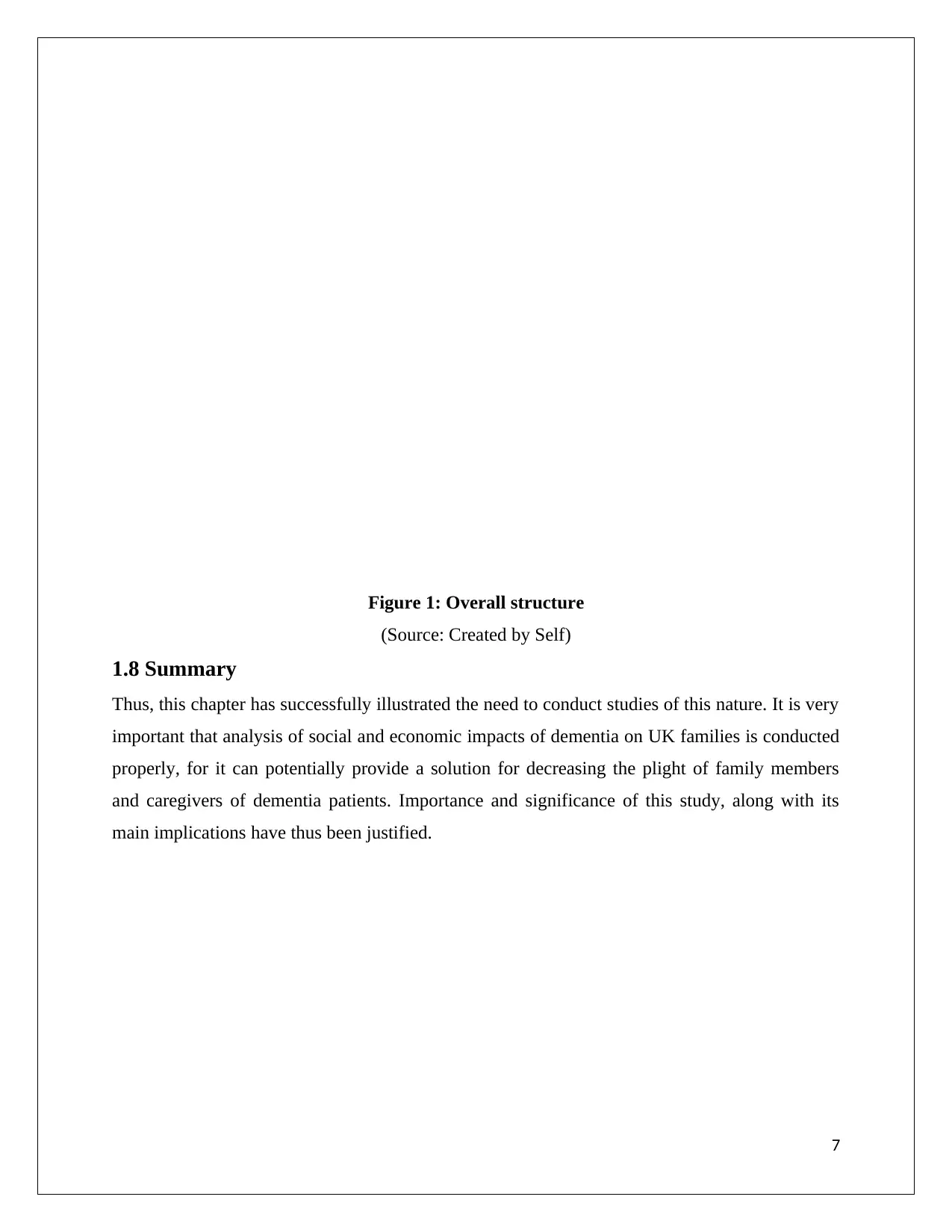
Figure 1: Overall structure
(Source: Created by Self)
1.8 Summary
Thus, this chapter has successfully illustrated the need to conduct studies of this nature. It is very
important that analysis of social and economic impacts of dementia on UK families is conducted
properly, for it can potentially provide a solution for decreasing the plight of family members
and caregivers of dementia patients. Importance and significance of this study, along with its
main implications have thus been justified.
7
Chapter1:IntroductionChapter2:LiteratureReviewChapter3:ResearchMethodologyChapter4:DataAnalysisChpater5:ConclusionandRecommendations
(Source: Created by Self)
1.8 Summary
Thus, this chapter has successfully illustrated the need to conduct studies of this nature. It is very
important that analysis of social and economic impacts of dementia on UK families is conducted
properly, for it can potentially provide a solution for decreasing the plight of family members
and caregivers of dementia patients. Importance and significance of this study, along with its
main implications have thus been justified.
7
Chapter1:IntroductionChapter2:LiteratureReviewChapter3:ResearchMethodologyChapter4:DataAnalysisChpater5:ConclusionandRecommendations
Paraphrase This Document
Need a fresh take? Get an instant paraphrase of this document with our AI Paraphraser
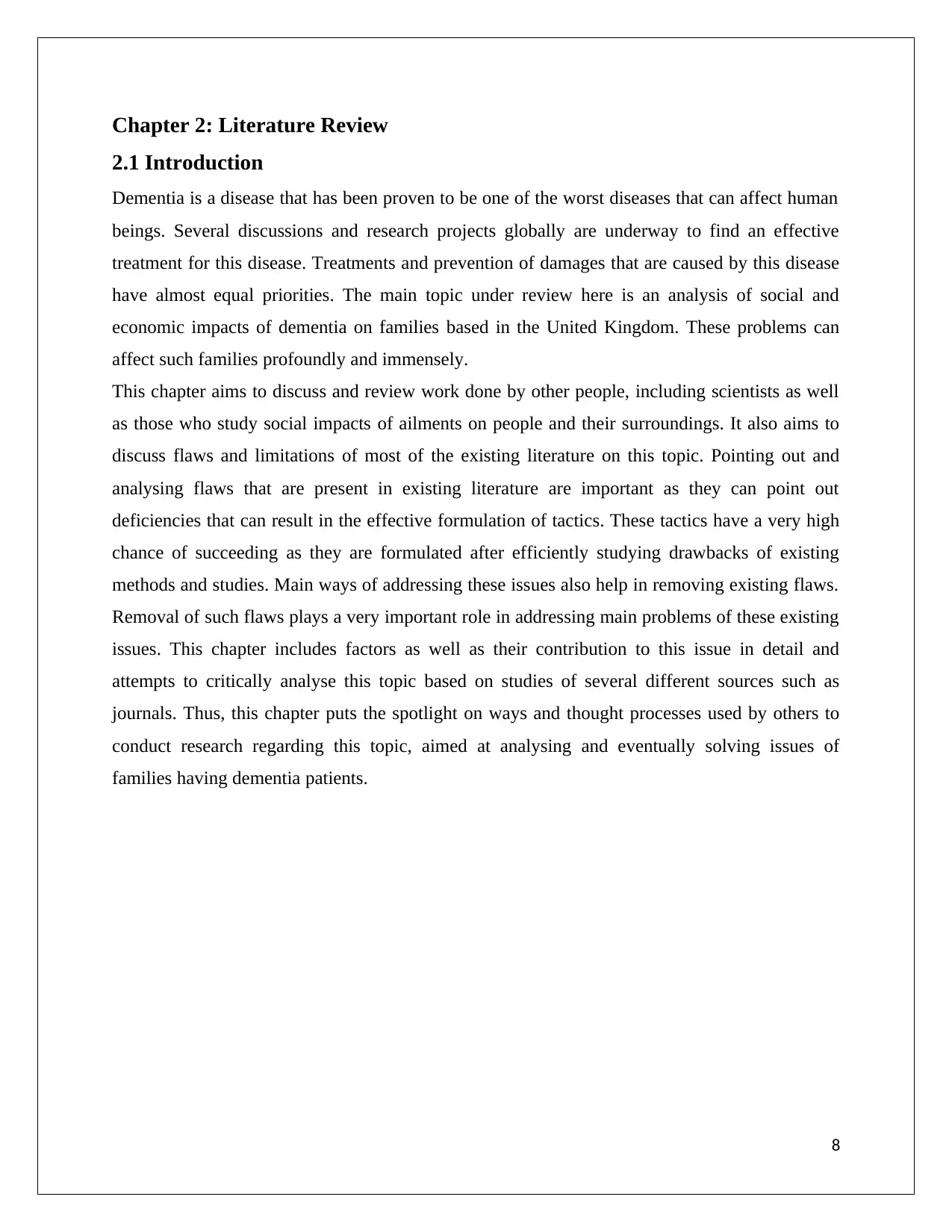
Chapter 2: Literature Review
2.1 Introduction
Dementia is a disease that has been proven to be one of the worst diseases that can affect human
beings. Several discussions and research projects globally are underway to find an effective
treatment for this disease. Treatments and prevention of damages that are caused by this disease
have almost equal priorities. The main topic under review here is an analysis of social and
economic impacts of dementia on families based in the United Kingdom. These problems can
affect such families profoundly and immensely.
This chapter aims to discuss and review work done by other people, including scientists as well
as those who study social impacts of ailments on people and their surroundings. It also aims to
discuss flaws and limitations of most of the existing literature on this topic. Pointing out and
analysing flaws that are present in existing literature are important as they can point out
deficiencies that can result in the effective formulation of tactics. These tactics have a very high
chance of succeeding as they are formulated after efficiently studying drawbacks of existing
methods and studies. Main ways of addressing these issues also help in removing existing flaws.
Removal of such flaws plays a very important role in addressing main problems of these existing
issues. This chapter includes factors as well as their contribution to this issue in detail and
attempts to critically analyse this topic based on studies of several different sources such as
journals. Thus, this chapter puts the spotlight on ways and thought processes used by others to
conduct research regarding this topic, aimed at analysing and eventually solving issues of
families having dementia patients.
8
2.1 Introduction
Dementia is a disease that has been proven to be one of the worst diseases that can affect human
beings. Several discussions and research projects globally are underway to find an effective
treatment for this disease. Treatments and prevention of damages that are caused by this disease
have almost equal priorities. The main topic under review here is an analysis of social and
economic impacts of dementia on families based in the United Kingdom. These problems can
affect such families profoundly and immensely.
This chapter aims to discuss and review work done by other people, including scientists as well
as those who study social impacts of ailments on people and their surroundings. It also aims to
discuss flaws and limitations of most of the existing literature on this topic. Pointing out and
analysing flaws that are present in existing literature are important as they can point out
deficiencies that can result in the effective formulation of tactics. These tactics have a very high
chance of succeeding as they are formulated after efficiently studying drawbacks of existing
methods and studies. Main ways of addressing these issues also help in removing existing flaws.
Removal of such flaws plays a very important role in addressing main problems of these existing
issues. This chapter includes factors as well as their contribution to this issue in detail and
attempts to critically analyse this topic based on studies of several different sources such as
journals. Thus, this chapter puts the spotlight on ways and thought processes used by others to
conduct research regarding this topic, aimed at analysing and eventually solving issues of
families having dementia patients.
8
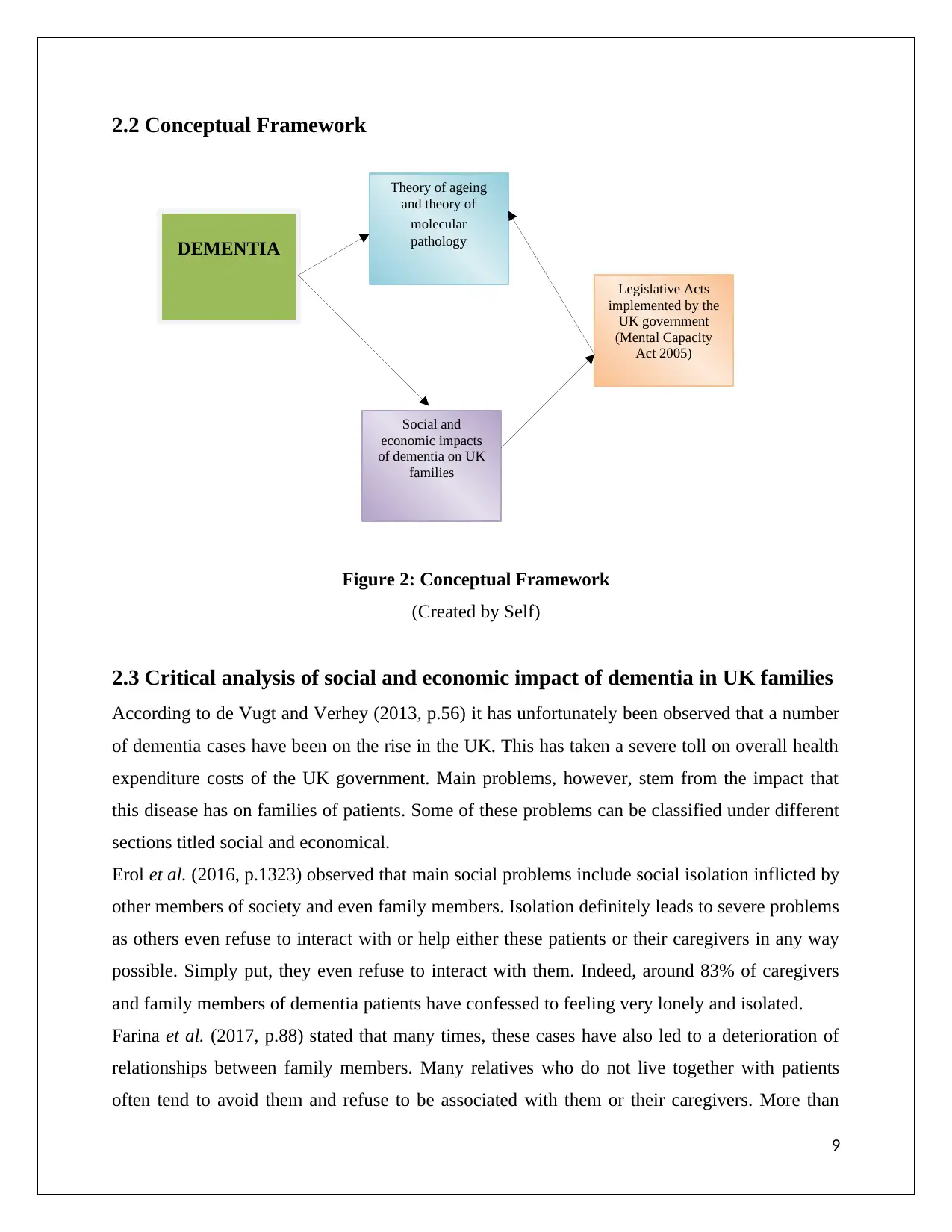
DEMENTIA
Legislative Acts
implemented by the
UK government
(Mental Capacity
Act 2005)
Social and
economic impacts
of dementia on UK
families
Theory of ageing
and theory of
molecular
pathology
2.2 Conceptual Framework
Figure 2: Conceptual Framework
(Created by Self)
2.3 Critical analysis of social and economic impact of dementia in UK families
According to de Vugt and Verhey (2013, p.56) it has unfortunately been observed that a number
of dementia cases have been on the rise in the UK. This has taken a severe toll on overall health
expenditure costs of the UK government. Main problems, however, stem from the impact that
this disease has on families of patients. Some of these problems can be classified under different
sections titled social and economical.
Erol et al. (2016, p.1323) observed that main social problems include social isolation inflicted by
other members of society and even family members. Isolation definitely leads to severe problems
as others even refuse to interact with or help either these patients or their caregivers in any way
possible. Simply put, they even refuse to interact with them. Indeed, around 83% of caregivers
and family members of dementia patients have confessed to feeling very lonely and isolated.
Farina et al. (2017, p.88) stated that many times, these cases have also led to a deterioration of
relationships between family members. Many relatives who do not live together with patients
often tend to avoid them and refuse to be associated with them or their caregivers. More than
9
Legislative Acts
implemented by the
UK government
(Mental Capacity
Act 2005)
Social and
economic impacts
of dementia on UK
families
Theory of ageing
and theory of
molecular
pathology
2.2 Conceptual Framework
Figure 2: Conceptual Framework
(Created by Self)
2.3 Critical analysis of social and economic impact of dementia in UK families
According to de Vugt and Verhey (2013, p.56) it has unfortunately been observed that a number
of dementia cases have been on the rise in the UK. This has taken a severe toll on overall health
expenditure costs of the UK government. Main problems, however, stem from the impact that
this disease has on families of patients. Some of these problems can be classified under different
sections titled social and economical.
Erol et al. (2016, p.1323) observed that main social problems include social isolation inflicted by
other members of society and even family members. Isolation definitely leads to severe problems
as others even refuse to interact with or help either these patients or their caregivers in any way
possible. Simply put, they even refuse to interact with them. Indeed, around 83% of caregivers
and family members of dementia patients have confessed to feeling very lonely and isolated.
Farina et al. (2017, p.88) stated that many times, these cases have also led to a deterioration of
relationships between family members. Many relatives who do not live together with patients
often tend to avoid them and refuse to be associated with them or their caregivers. More than
9
⊘ This is a preview!⊘
Do you want full access?
Subscribe today to unlock all pages.

Trusted by 1+ million students worldwide
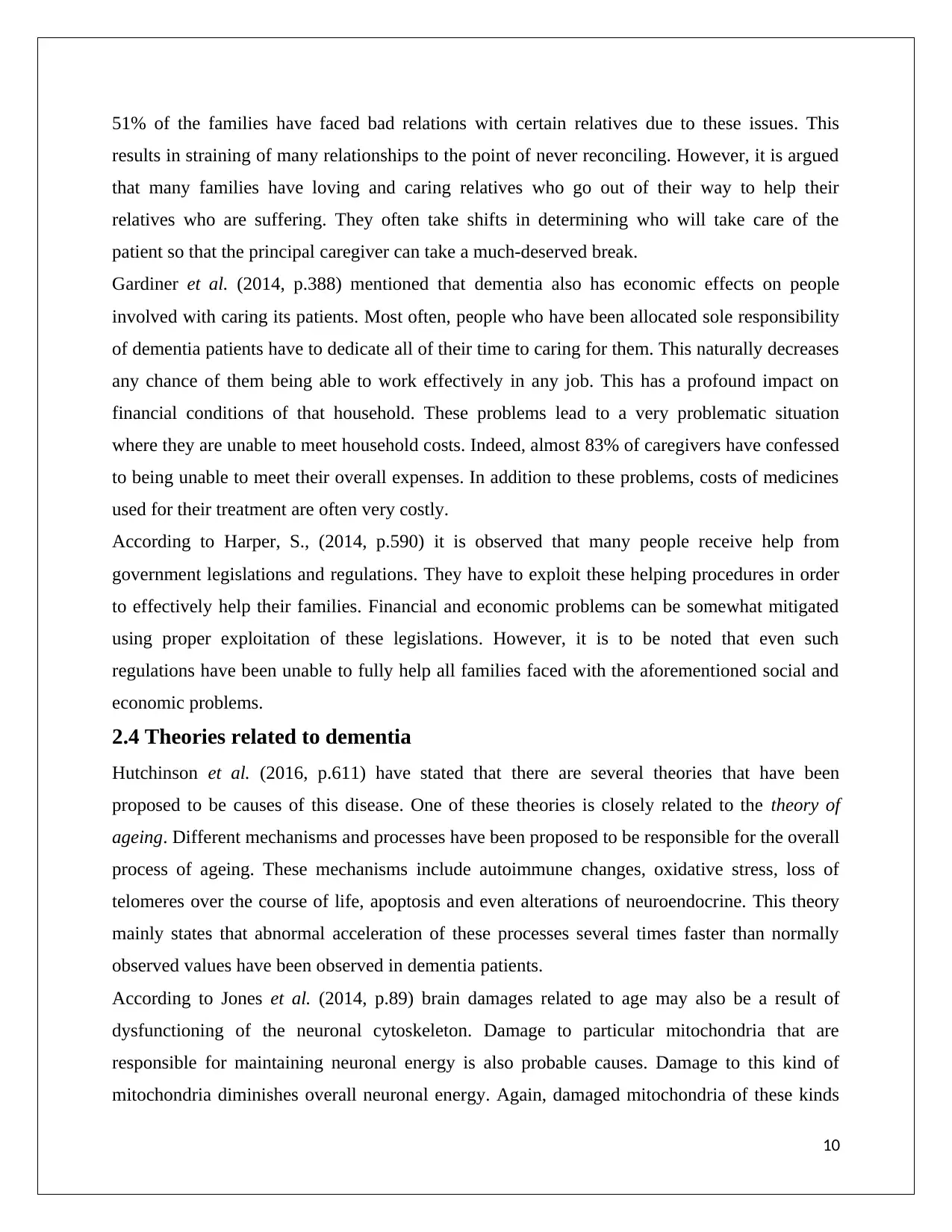
51% of the families have faced bad relations with certain relatives due to these issues. This
results in straining of many relationships to the point of never reconciling. However, it is argued
that many families have loving and caring relatives who go out of their way to help their
relatives who are suffering. They often take shifts in determining who will take care of the
patient so that the principal caregiver can take a much-deserved break.
Gardiner et al. (2014, p.388) mentioned that dementia also has economic effects on people
involved with caring its patients. Most often, people who have been allocated sole responsibility
of dementia patients have to dedicate all of their time to caring for them. This naturally decreases
any chance of them being able to work effectively in any job. This has a profound impact on
financial conditions of that household. These problems lead to a very problematic situation
where they are unable to meet household costs. Indeed, almost 83% of caregivers have confessed
to being unable to meet their overall expenses. In addition to these problems, costs of medicines
used for their treatment are often very costly.
According to Harper, S., (2014, p.590) it is observed that many people receive help from
government legislations and regulations. They have to exploit these helping procedures in order
to effectively help their families. Financial and economic problems can be somewhat mitigated
using proper exploitation of these legislations. However, it is to be noted that even such
regulations have been unable to fully help all families faced with the aforementioned social and
economic problems.
2.4 Theories related to dementia
Hutchinson et al. (2016, p.611) have stated that there are several theories that have been
proposed to be causes of this disease. One of these theories is closely related to the theory of
ageing. Different mechanisms and processes have been proposed to be responsible for the overall
process of ageing. These mechanisms include autoimmune changes, oxidative stress, loss of
telomeres over the course of life, apoptosis and even alterations of neuroendocrine. This theory
mainly states that abnormal acceleration of these processes several times faster than normally
observed values have been observed in dementia patients.
According to Jones et al. (2014, p.89) brain damages related to age may also be a result of
dysfunctioning of the neuronal cytoskeleton. Damage to particular mitochondria that are
responsible for maintaining neuronal energy is also probable causes. Damage to this kind of
mitochondria diminishes overall neuronal energy. Again, damaged mitochondria of these kinds
10
results in straining of many relationships to the point of never reconciling. However, it is argued
that many families have loving and caring relatives who go out of their way to help their
relatives who are suffering. They often take shifts in determining who will take care of the
patient so that the principal caregiver can take a much-deserved break.
Gardiner et al. (2014, p.388) mentioned that dementia also has economic effects on people
involved with caring its patients. Most often, people who have been allocated sole responsibility
of dementia patients have to dedicate all of their time to caring for them. This naturally decreases
any chance of them being able to work effectively in any job. This has a profound impact on
financial conditions of that household. These problems lead to a very problematic situation
where they are unable to meet household costs. Indeed, almost 83% of caregivers have confessed
to being unable to meet their overall expenses. In addition to these problems, costs of medicines
used for their treatment are often very costly.
According to Harper, S., (2014, p.590) it is observed that many people receive help from
government legislations and regulations. They have to exploit these helping procedures in order
to effectively help their families. Financial and economic problems can be somewhat mitigated
using proper exploitation of these legislations. However, it is to be noted that even such
regulations have been unable to fully help all families faced with the aforementioned social and
economic problems.
2.4 Theories related to dementia
Hutchinson et al. (2016, p.611) have stated that there are several theories that have been
proposed to be causes of this disease. One of these theories is closely related to the theory of
ageing. Different mechanisms and processes have been proposed to be responsible for the overall
process of ageing. These mechanisms include autoimmune changes, oxidative stress, loss of
telomeres over the course of life, apoptosis and even alterations of neuroendocrine. This theory
mainly states that abnormal acceleration of these processes several times faster than normally
observed values have been observed in dementia patients.
According to Jones et al. (2014, p.89) brain damages related to age may also be a result of
dysfunctioning of the neuronal cytoskeleton. Damage to particular mitochondria that are
responsible for maintaining neuronal energy is also probable causes. Damage to this kind of
mitochondria diminishes overall neuronal energy. Again, damaged mitochondria of these kinds
10
Paraphrase This Document
Need a fresh take? Get an instant paraphrase of this document with our AI Paraphraser
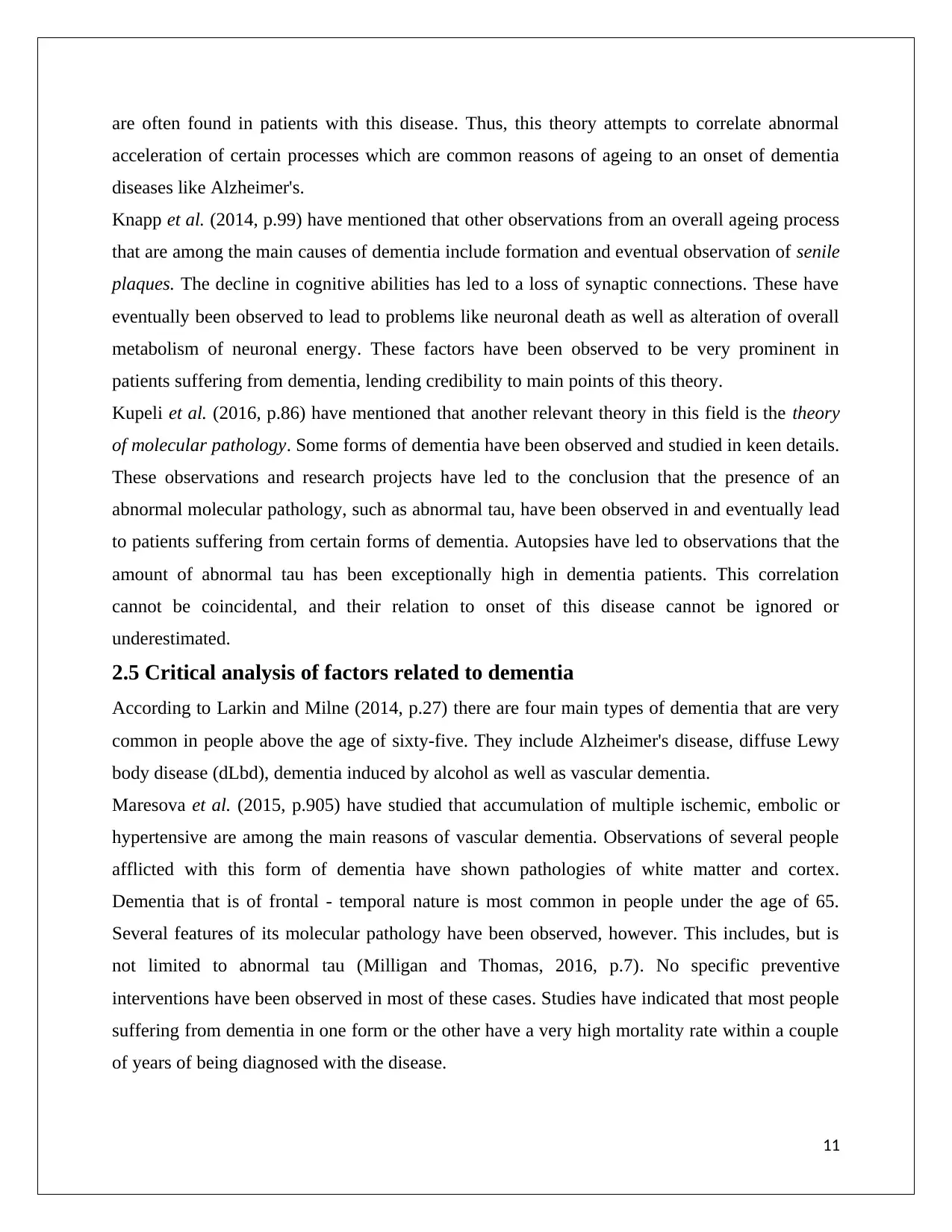
are often found in patients with this disease. Thus, this theory attempts to correlate abnormal
acceleration of certain processes which are common reasons of ageing to an onset of dementia
diseases like Alzheimer's.
Knapp et al. (2014, p.99) have mentioned that other observations from an overall ageing process
that are among the main causes of dementia include formation and eventual observation of senile
plaques. The decline in cognitive abilities has led to a loss of synaptic connections. These have
eventually been observed to lead to problems like neuronal death as well as alteration of overall
metabolism of neuronal energy. These factors have been observed to be very prominent in
patients suffering from dementia, lending credibility to main points of this theory.
Kupeli et al. (2016, p.86) have mentioned that another relevant theory in this field is the theory
of molecular pathology. Some forms of dementia have been observed and studied in keen details.
These observations and research projects have led to the conclusion that the presence of an
abnormal molecular pathology, such as abnormal tau, have been observed in and eventually lead
to patients suffering from certain forms of dementia. Autopsies have led to observations that the
amount of abnormal tau has been exceptionally high in dementia patients. This correlation
cannot be coincidental, and their relation to onset of this disease cannot be ignored or
underestimated.
2.5 Critical analysis of factors related to dementia
According to Larkin and Milne (2014, p.27) there are four main types of dementia that are very
common in people above the age of sixty-five. They include Alzheimer's disease, diffuse Lewy
body disease (dLbd), dementia induced by alcohol as well as vascular dementia.
Maresova et al. (2015, p.905) have studied that accumulation of multiple ischemic, embolic or
hypertensive are among the main reasons of vascular dementia. Observations of several people
afflicted with this form of dementia have shown pathologies of white matter and cortex.
Dementia that is of frontal - temporal nature is most common in people under the age of 65.
Several features of its molecular pathology have been observed, however. This includes, but is
not limited to abnormal tau (Milligan and Thomas, 2016, p.7). No specific preventive
interventions have been observed in most of these cases. Studies have indicated that most people
suffering from dementia in one form or the other have a very high mortality rate within a couple
of years of being diagnosed with the disease.
11
acceleration of certain processes which are common reasons of ageing to an onset of dementia
diseases like Alzheimer's.
Knapp et al. (2014, p.99) have mentioned that other observations from an overall ageing process
that are among the main causes of dementia include formation and eventual observation of senile
plaques. The decline in cognitive abilities has led to a loss of synaptic connections. These have
eventually been observed to lead to problems like neuronal death as well as alteration of overall
metabolism of neuronal energy. These factors have been observed to be very prominent in
patients suffering from dementia, lending credibility to main points of this theory.
Kupeli et al. (2016, p.86) have mentioned that another relevant theory in this field is the theory
of molecular pathology. Some forms of dementia have been observed and studied in keen details.
These observations and research projects have led to the conclusion that the presence of an
abnormal molecular pathology, such as abnormal tau, have been observed in and eventually lead
to patients suffering from certain forms of dementia. Autopsies have led to observations that the
amount of abnormal tau has been exceptionally high in dementia patients. This correlation
cannot be coincidental, and their relation to onset of this disease cannot be ignored or
underestimated.
2.5 Critical analysis of factors related to dementia
According to Larkin and Milne (2014, p.27) there are four main types of dementia that are very
common in people above the age of sixty-five. They include Alzheimer's disease, diffuse Lewy
body disease (dLbd), dementia induced by alcohol as well as vascular dementia.
Maresova et al. (2015, p.905) have studied that accumulation of multiple ischemic, embolic or
hypertensive are among the main reasons of vascular dementia. Observations of several people
afflicted with this form of dementia have shown pathologies of white matter and cortex.
Dementia that is of frontal - temporal nature is most common in people under the age of 65.
Several features of its molecular pathology have been observed, however. This includes, but is
not limited to abnormal tau (Milligan and Thomas, 2016, p.7). No specific preventive
interventions have been observed in most of these cases. Studies have indicated that most people
suffering from dementia in one form or the other have a very high mortality rate within a couple
of years of being diagnosed with the disease.
11
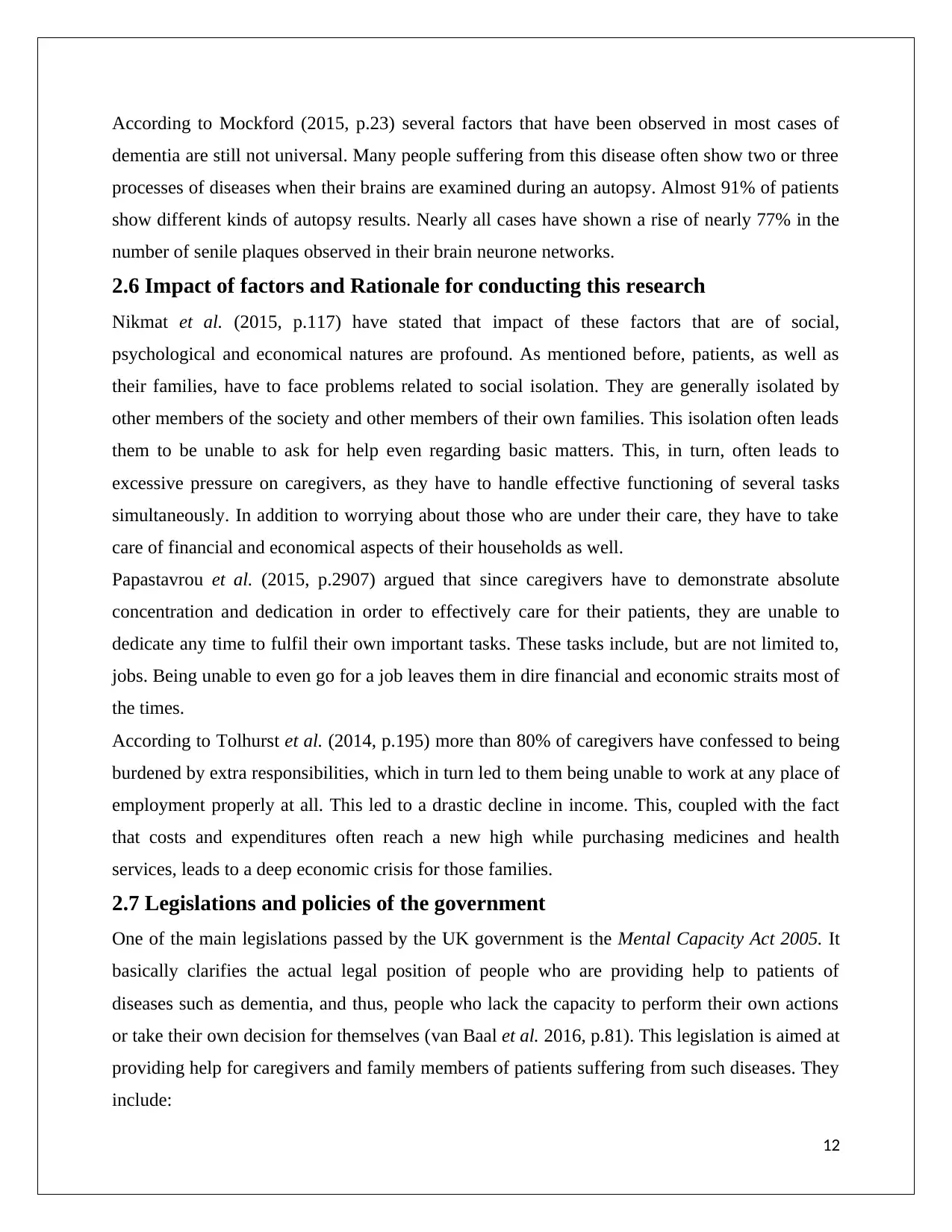
According to Mockford (2015, p.23) several factors that have been observed in most cases of
dementia are still not universal. Many people suffering from this disease often show two or three
processes of diseases when their brains are examined during an autopsy. Almost 91% of patients
show different kinds of autopsy results. Nearly all cases have shown a rise of nearly 77% in the
number of senile plaques observed in their brain neurone networks.
2.6 Impact of factors and Rationale for conducting this research
Nikmat et al. (2015, p.117) have stated that impact of these factors that are of social,
psychological and economical natures are profound. As mentioned before, patients, as well as
their families, have to face problems related to social isolation. They are generally isolated by
other members of the society and other members of their own families. This isolation often leads
them to be unable to ask for help even regarding basic matters. This, in turn, often leads to
excessive pressure on caregivers, as they have to handle effective functioning of several tasks
simultaneously. In addition to worrying about those who are under their care, they have to take
care of financial and economical aspects of their households as well.
Papastavrou et al. (2015, p.2907) argued that since caregivers have to demonstrate absolute
concentration and dedication in order to effectively care for their patients, they are unable to
dedicate any time to fulfil their own important tasks. These tasks include, but are not limited to,
jobs. Being unable to even go for a job leaves them in dire financial and economic straits most of
the times.
According to Tolhurst et al. (2014, p.195) more than 80% of caregivers have confessed to being
burdened by extra responsibilities, which in turn led to them being unable to work at any place of
employment properly at all. This led to a drastic decline in income. This, coupled with the fact
that costs and expenditures often reach a new high while purchasing medicines and health
services, leads to a deep economic crisis for those families.
2.7 Legislations and policies of the government
One of the main legislations passed by the UK government is the Mental Capacity Act 2005. It
basically clarifies the actual legal position of people who are providing help to patients of
diseases such as dementia, and thus, people who lack the capacity to perform their own actions
or take their own decision for themselves (van Baal et al. 2016, p.81). This legislation is aimed at
providing help for caregivers and family members of patients suffering from such diseases. They
include:
12
dementia are still not universal. Many people suffering from this disease often show two or three
processes of diseases when their brains are examined during an autopsy. Almost 91% of patients
show different kinds of autopsy results. Nearly all cases have shown a rise of nearly 77% in the
number of senile plaques observed in their brain neurone networks.
2.6 Impact of factors and Rationale for conducting this research
Nikmat et al. (2015, p.117) have stated that impact of these factors that are of social,
psychological and economical natures are profound. As mentioned before, patients, as well as
their families, have to face problems related to social isolation. They are generally isolated by
other members of the society and other members of their own families. This isolation often leads
them to be unable to ask for help even regarding basic matters. This, in turn, often leads to
excessive pressure on caregivers, as they have to handle effective functioning of several tasks
simultaneously. In addition to worrying about those who are under their care, they have to take
care of financial and economical aspects of their households as well.
Papastavrou et al. (2015, p.2907) argued that since caregivers have to demonstrate absolute
concentration and dedication in order to effectively care for their patients, they are unable to
dedicate any time to fulfil their own important tasks. These tasks include, but are not limited to,
jobs. Being unable to even go for a job leaves them in dire financial and economic straits most of
the times.
According to Tolhurst et al. (2014, p.195) more than 80% of caregivers have confessed to being
burdened by extra responsibilities, which in turn led to them being unable to work at any place of
employment properly at all. This led to a drastic decline in income. This, coupled with the fact
that costs and expenditures often reach a new high while purchasing medicines and health
services, leads to a deep economic crisis for those families.
2.7 Legislations and policies of the government
One of the main legislations passed by the UK government is the Mental Capacity Act 2005. It
basically clarifies the actual legal position of people who are providing help to patients of
diseases such as dementia, and thus, people who lack the capacity to perform their own actions
or take their own decision for themselves (van Baal et al. 2016, p.81). This legislation is aimed at
providing help for caregivers and family members of patients suffering from such diseases. They
include:
12
⊘ This is a preview!⊘
Do you want full access?
Subscribe today to unlock all pages.

Trusted by 1+ million students worldwide
1 out of 29
Related Documents
Your All-in-One AI-Powered Toolkit for Academic Success.
+13062052269
info@desklib.com
Available 24*7 on WhatsApp / Email
![[object Object]](/_next/static/media/star-bottom.7253800d.svg)
Unlock your academic potential
Copyright © 2020–2025 A2Z Services. All Rights Reserved. Developed and managed by ZUCOL.




